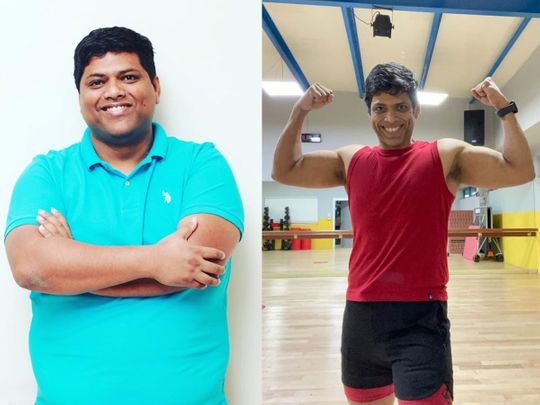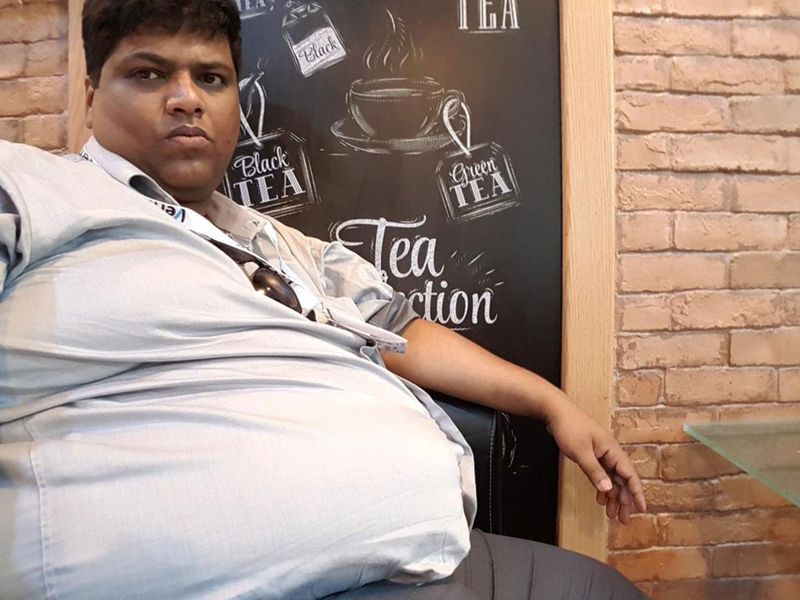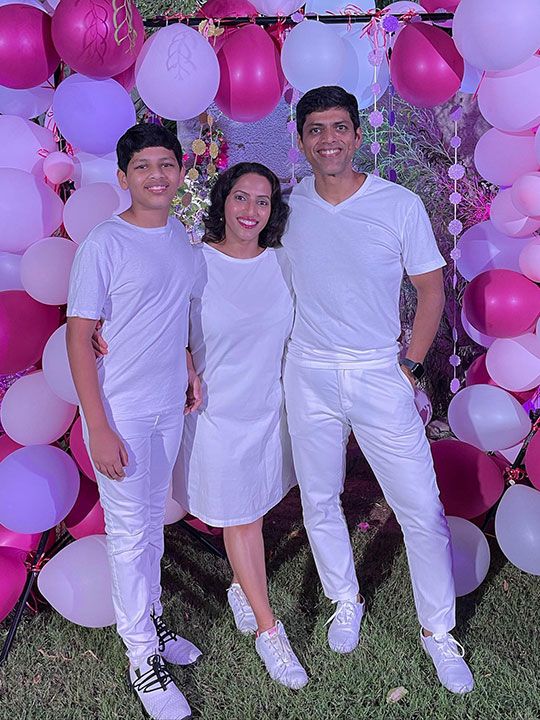
“You cannot outrun a bad diet,” says Lijo Ittoop, a 46-year-old Indian expat based in Dubai. He knows what he’s talking about; he’s seen both sides of the field.
Three years into his course correction, Ittoop has lost about 53 kilos. And he plans to keep it up. It’s a mind-set thing, he explains. “I’ve realised whenever you go into maintaining the weight, that’s the start of the downfall. With maintenance, you say, this is one kilo, this I can manage. Two kilos, I can manage … before you realise it, you’ve put on five or six kilos. So my entire thing is – I need to bring my weight down.”
His journey to his current lifestyle began with his father’s jibe. While on a visit to his home country, his father sat him down and asked, quietly, “‘Will you go before us?”
“As a father myself, I knew it would have taken a lot for him to say that. And I was a sports person before work life took over, so that made me think … I always knew at the back of my mind that this isn’t the right thing to do [leading an unhealthy lifestyle], but then I needed that kick in the gut before I did what I needed to do,” he recalls.
So when he returned to the UAE, he began his search for gyms – and found help at Ultimate Performance. “I knew that at that weight, I needed professional help. Because, at that weight, there’s a high chance of injury if you try to do something on your own. I used to work out with them almost four times a week for almost three months, and had a very strict diet. On August 8 or 9 I started my sessions,” he explains.
“For three weeks I was bang on target, and then I started craving things,” he laughs.

And explains that while he didn’t have physical manifestations such as headaches or stomach pains, he did have a mental playground to master. “When you do a calorie deficit, typically, a few things happen to your body; you feel colder. I never knew this – I used to go to the gym and I would feel cold – I was the only guy wearing a jacket. And everyone seemed to be very warm.
“Secondly, your sleep patterns go for a toss. [And if they do] then you are cranky through the day. Thirdly, you will have to accept you will have strong hunger pangs. I used to also do intermittent fasting,” he recalls.
Dealing with cravings
When your fitness journey is a long and winding road, explains Ittoop, the turns come with various cravings; some favourites from your ‘feeding days’, others a complete mystery. “It’s quite interesting that over a period of time, my cravings keep changing. So at that point of time, it used to be biryani for some reason. Today, I crave burgers – something I’ve never really longed for,” he says.
Four weeks into the programme, Ittoop was allowed a cheat meal. “Then it [my diet] became more sustainable. Then I started to plan ahead of time, so I knew if I had a cheat meal or cheat day, then accordingly I’d fine tune through the week,” he says.
Since each meal – including oil - was weighed on a kitchen scale, Ittoop explains, it took some getting used to. “Everything was weighed, cooked, packed and kept. I did not leave anything to chance. I used to carry my breakfast, lunch, dinner, snacks, everything with me to work. Because I knew that if I were hungry at 2 or 3pm and I didn’t have anything healthy to eat, I may just order out. I was always at that risk,” he says.
Dealing with challenges
“One of the biggest challenges I overcame was COVID-19; I couldn’t go and workout in the gym, so my weight started to go up again,” he says. “I can’t go for walks – I find it extremely boring. Two minutes feel like two hours. I can go to the gym, play any sports, but I can’t go for walks. But then during COVID-19, there were no sporting activities for me and then my food habits went for a toss, ordering in started and I started gaining it back.”
He adds: “The biggest challenge remained food. It wasn’t the workout. 70-80 per cent of your journey is just food. If you say I can have junk food and I’ll burn it, doesn’t happen. And as you grow older, your metabolism is also not the best.”
Then there was familial pressure – those who had told him at his heaviest that he needed to lose weight, were now starting to express concern at his body, which seemed to get leaner with each passing week. “Every time I would go home, my parents, my uncles, my aunts, every single person would say, ‘Enough, you are getting weak’. It was so difficult to convince them that I am getting stronger. I am stronger than I was ever before,” he says.
And there was peer pressure. Weekends tended to come with social obligations where often Ittoop would need to parry the food offers. “It’s human psychology – because they are not doing it, and they don’t mean harm deliberately but from a very subconscious level they want you to make that mistake to feel happy about themselves. And I would also feel the same. Because when I started putting on weight, I would also look at others who put on weight … if both are gaining it’s fine,” he laughs.
“It’s been a mix of ups and downs over the period, but now over the past six to nine months it’s become a proper habit. So I’m now getting stronger and stronger. I’ve learned what my triggers are. I now have a more sustainable lifestyle,” says the proud dad of one. Today, he says, his son knows and can talk about macros. “That’s the conversation that goes around the house and he’s conscious. Of course he’s a kid, he loves junk and he eats junk. The point is not to have him live a life without junk, it’s to find a way of making sure there’s balance.”
ALSO READ
- UAE weight loss: 'How I lost 30kg in five months'
- UAE mum's weight-loss: 'How I lost 40kg and helped my pre-teen son lose 20kg'
- UAE weight-loss story: 'How I lost 20kg in 4 months'
- UAE weight-loss: 'How I lost 19kg in 3 months'
- UAE weight loss: 'How I lost almost 15kg in two months after giving birth'
That really helped, he says, the support of family. “The best part was, my family was with me on my journey; this can’t happen without your family. You can’t have chocolates or biscuits at home when you try to lose weight. My wife also lost around 20kg around the same point of time. Her diet is very different from mine – she has her idli, dosa, sambar, poha, but exercises extreme portion control,” he explains.

As a foodie, it’s tough to cut out favourite dishes and without familiar flavour it’s easy to fall off the bandwagon, admits Ittoop, explaining how he moulded his diet to complement his palette. “Initially, I used to have boiled food, which was boring. Then, one of my friends who is into cooking said, ‘Don’t grill and eat the chicken, because you would want flavour and spice in every part. So then I used to take cubes of chicken, put masala (spice) and air fry it and it wouldn’t be so bland anymore,” he says.
A want for sweets was another thing that crept up on him. “If I have a craving for sweets; I make a cupcake by myself. I take an egg, put some baking powder, one scoop of chocolate-flavoured whey protein into a cup and maybe add cocoa powder. Mix it and microwave it for 30 seconds, you get a semi-gooey chocolate cupcake.”
He credits the book ‘Atomic Habits: An Easy & Proven Way to Build Good Habits & Break Bad Ones’ by James Clear for his shift in outlook. He says, “As you grow older, you know your trigger points. Trigger points are as simple as – I have to go to the gym tomorrow; so you get up in the morning and say, ‘Where are my clothes?’ When you can’t find them, you say, ‘Let it be’, and put it off. If that’s your trigger, make sure you are ready the previous night.” By keeping an eye on the things that spur him into unhealthy behaviour Ittoop has made his path clearer.
His gaze is always on his plate. “You can’t run from a bad diet,” he says.











